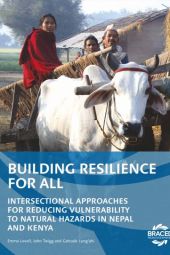Building Resilience for All Inter-sectional Approaches for Reducing Vulnerability to Natural Hazards in Nepal and Kenya
Summary
This research is part of a package from the Building Resilience and Adaptation to Climate Extremes and Disasters (BRACED) programme, looking at the application of intersectional approaches in vulnerability reduction and resilience-building. This research, part of the Building Resilience and Adaptation to Climate Extremes and Disasters (BRACED) program, focuses on applying intersectional approaches to vulnerability reduction and resilience-building. The aim is to understand how various factors intersect, leading to exclusion, inequality, and vulnerabilities in multi-hazard contexts. Factors such as age, sex, socioeconomic background, ethnicity, and health play crucial roles during disasters, disproportionately affecting marginalized groups. The research employs an intersectional analysis that examines how different categories of social difference and disadvantage interact, influencing human well-being, relationships, and inequality. To address the lack of a standardized approach for intersectional understanding of vulnerability and resilience in the context of hazards, climate change, and variability, the project field-tests a practical operational toolkit. This toolkit is an enhanced version of a previous model developed by the Overseas Development Institute (ODI) and ActionAid, originally designed to identify gender-based differences in resilience to natural hazards and climate change.
Categories:
Research Paper
Publisher:
Braced Knowledge Manager
Published Year:
2019
